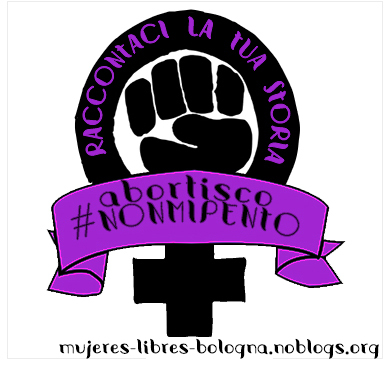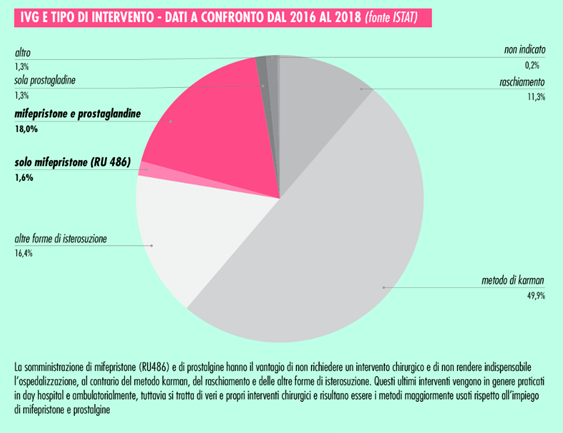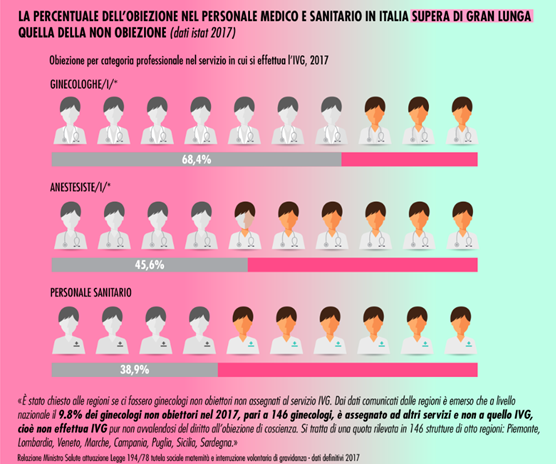The Covid-19 crisis has put the economic, social and health systems of all over the world on its heads. The majority of the institutions have shown their lack of responsiveness, and inequalities within our societies have become even more obvious. An Italian feminist collective decided to create a network of pro-choice realities in order to support and guide women* who were seeking for an abortion.
We know that in these difficult times, it has been extremely hard to access essential services such as abortion without risk or difficulty. This is why Mujeres Libres -a transfeminist, antifascist collective based in Bologna since 2007- decided to constantly monitor the protocols on access to VToP (voluntary termination of pregnancy) since the beginning of the lockdown. Mujeres Libres found out that information on the access to abortion was discordant.
Background Reality
In Italy, the path for abortion is far from being simple. If you find out you are pregnant and you decide you want to get an abortion, you need: a reported pregnancy test, obtainable through urine or blood analysis given by a laboratory – essential for the medical certificate that allows the operation. The certificate must be signed by a doctor outside the hospital.
Everything could be feasible in normal times, but during a pandemic it is risky to go to pharmacies or anywhere else you could get a test, and also, we know that going to a hospital in those specific times means exposing yourself to the virus. On top of that, some hospitals shut down their abortion services, in order to divert their staff to Covid-19 patients.
If women* are lucky enough to get the analysis done, they still have to wish that the doctor that should sign the certificate, is not an objector of conscience. What is that exactly?
With the law 194/1978 – that legalized abortion in Italy – it was also established that if you are a health professional and you declare that you are an objector of conscience, you are legally protected if you refuse to practise an abortion. This rule is applicable not only for doctors, but also for nurses and anesthetists. If you consider that in the country more than 70% of the doctors are objectors of conscience, and in some regions, this number rises to 93%, you can easily understand why it is so hard to get an abortion in the country of the Vatican.
Sorority and collective-care is key, especially when institutions are slow to respond and unwilling to hear women*s voices
But let’s say you obtained the certificate: then you would have to go to the hospital (hoping that measures to protect you from the virus are put in place) and require an abortion. You think you are done. But no. You won’t be able to get the abortion straight away, since in Italy they think you need a one-week ‘pause for reflection’, where in some cases, women* have been contacted by catholic organizations to make them change their mind or worse, accusing them to be killers.
We know that there are different methods with which you can get an abortion, we can divide them into two major groups: surgical abortion and labor induced abortion. With the first ones, we find the Karman technique and the Manual vacuum aspiration (MVA), amongst others. In the latter, women* can swallow different combinations of chemicals, such as mifepristone with misoprostol (Cytotec), or only mifepristone (RU486).
The use of RU486 is strongly recommended also from the World Health Organization (WHO), since it is less intrusive and painful to the body than surgical abortion. Many women* prefer this method, considering it like a more natural abortion option, since it feels very similar to a miscarriage. It can be a private safe, and faster solution, since it also doesn’t require anesthesia or to spend the night in the hospital.
The obstacle race isn’t over
Pharmaceutical abortion with RU486 is not common in Italy, and actually 90% of abortions procedures are surgical. During a pandemic, this means creating further stress for women* that want to access the procedure, exposing them to the virus and making the process so much longer that it could be. Chirurgical abortions also mean ‘occupying’ beds and staff that could easily support the emergency response. We can say that, although abortion is formally legal in Italy, in reality it is very complex and exhausting process where many women could not be able to go through.
Just very recently, in the Italian region of Umbria, Donatella Tesei, from the right wing party Lega, supported by senator and Congress of Family participant and supporter Simone Pillon, repealed a resolution that allowed to practice drug abortion in day hospital. Now, all the women that want to access abortion, will have to spend three days in the hospital, resulting in a prolonged, unnecessary hospitalization that will only further damage women* psyche and freedom. In addition to that, this procedure will unnecessarily burden the already precarious health system. Public money will be waisted with no valid reason, if not a veiled punitive mechanism towards those women who make a choice that is badly reconciled with the archaic and retrograde values of the Lega party.
The abortion process should be lived in serenity: this is where self-determination passes, the control of the choices on women*s bodies must be left to them and only to them.
Besides all this, Mujeres Libres also realized that during the Covid-19 crisis, there was confusion about the steps to follow. Some operators of the gynecology department claimed it was absolutely necessary to present the medical certificate, others instead ensured that, given the pandemic in progress, you could safely go to the hospital without it. The lack of a clear and defined protocol on abortion prompted Mujeres Libres to give further support for women* who wanted to end their pregnancy. Through their Facebook page and blog, as well as connecting with other feminist realities that were monitoring the situation, (IVG ho abortito e sto benissimo; Rete Pro Choice; La Mala Educacion; Non Una di Meno Bologna; Obiezione Respinta) Mujeres Libres clarified the bureaucratic path to access the service and remembered that they offer free a moral and practical support for women* that need an abortion.
The emergency will go, we won’t
The abortion process should be lived in serenity: this is where self-determination passes, the control of the choices on women*s bodies must be left to them and only to them. Women* have the right to freely exercise their choices and in security. We learned some lessons from this emergency: it is clear that the reduction of the bureaucratic steps for abortion is possible, and the willingness to keep the status quo is a political decision, where the institutions seek to make the abortion process as difficult and traumatic as possible.
In order to make the procedure smoother, it would be extremely useful to have access to urinal and blood tests results in one day, for free. If we want to protect women* from exposure to the virus, tele-abortion should be allowed, as already happened in the UK and France. As feminists, we should fight to make this method possible also after the emergency. As WHO advises, the use of RU486 should be the norm when no medical complications are present. And also, the use of pharmaceutical abortion until the ninth week – as already happens in several countries of the European Union (France, Germany and the Netherlands) – should be applied also in Italy. Information on abortion should be clear, available online in different languages, so that migrant women* and foreigners can have access to emergency health care, as guaranteed by law.
But there’s also another fundamental take away: sorority and collective-care is key, especially when institutions are slow to respond and unwilling to hear women*s voices. We have to continue fighting for an accessible, free, safe abortion, but at the same time, we can keep weaving those feminist networks that have guaranteed the self-determination of women over the centuries, and will continue doing.
- Women*:Non-binary folks and transmen can experience unwanted pregnancies too.
- Women* was used to facilitate the reading of the document.








Average Rating